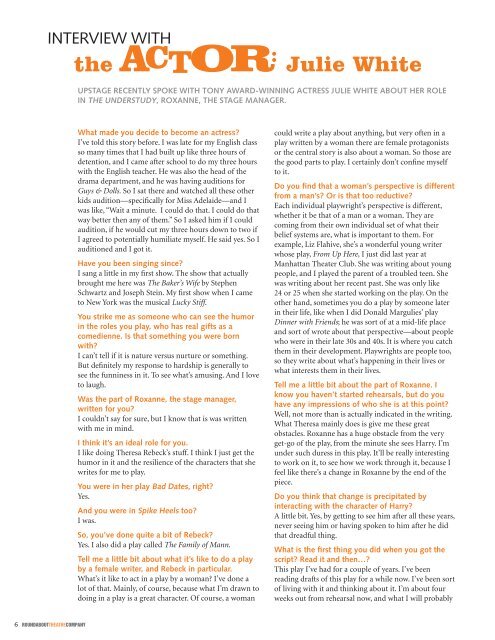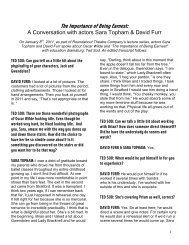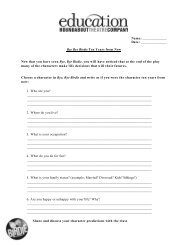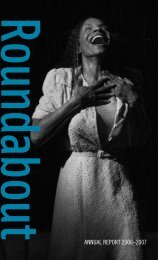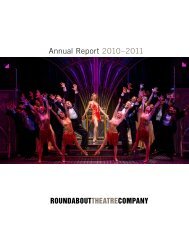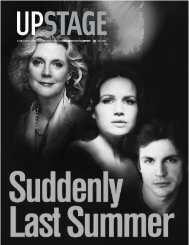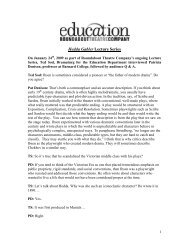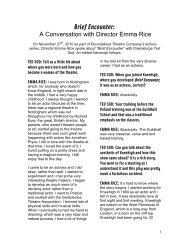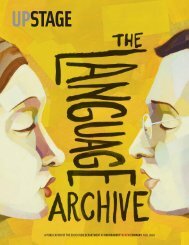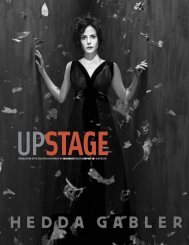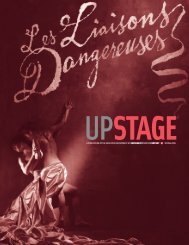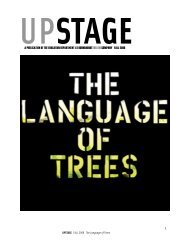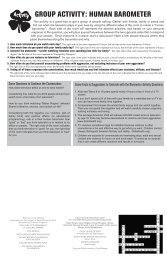The Understudy - Roundabout Theatre Company
The Understudy - Roundabout Theatre Company
The Understudy - Roundabout Theatre Company
You also want an ePaper? Increase the reach of your titles
YUMPU automatically turns print PDFs into web optimized ePapers that Google loves.
the Actor : IntervIew wIth<br />
Julie White<br />
6 <strong>Roundabout</strong>theatRe<strong>Company</strong><br />
UPSTAGE REcEnTly SPoKE WITh Tony AWARd-WInnInG AcTRESS JUlIE WhITE AboUT hER RolE<br />
In ThE UndERSTUdy, RoxAnnE, ThE STAGE mAnAGER.<br />
What made you decide to become an actress?<br />
I’ve told this story before. I was late for my English class<br />
so many times that I had built up like three hours of<br />
detention, and I came after school to do my three hours<br />
with the English teacher. He was also the head of the<br />
drama department, and he was having auditions for<br />
Guys & Dolls. So I sat there and watched all these other<br />
kids audition—specifically for Miss Adelaide—and I<br />
was like, “Wait a minute. I could do that. I could do that<br />
way better then any of them.” So I asked him if I could<br />
audition, if he would cut my three hours down to two if<br />
I agreed to potentially humiliate myself. He said yes. So I<br />
auditioned and I got it.<br />
have you been singing since?<br />
I sang a little in my first show. <strong>The</strong> show that actually<br />
brought me here was <strong>The</strong> Baker’s Wife by Stephen<br />
Schwartz and Joseph Stein. My first show when I came<br />
to New York was the musical Lucky Stiff.<br />
you strike me as someone who can see the humor<br />
in the roles you play, who has real gifts as a<br />
comedienne. Is that something you were born<br />
with?<br />
I can’t tell if it is nature versus nurture or something.<br />
But definitely my response to hardship is generally to<br />
see the funniness in it. To see what’s amusing. And I love<br />
to laugh.<br />
Was the part of Roxanne, the stage manager,<br />
written for you?<br />
I couldn’t say for sure, but I know that is was written<br />
with me in mind.<br />
I think it’s an ideal role for you.<br />
I like doing <strong>The</strong>resa Rebeck’s stuff. I think I just get the<br />
humor in it and the resilience of the characters that she<br />
writes for me to play.<br />
you were in her play bad dates, right?<br />
Yes.<br />
And you were in Spike heels too?<br />
I was.<br />
So, you’ve done quite a bit of Rebeck?<br />
Yes. I also did a play called <strong>The</strong> Family of Mann.<br />
Tell me a little bit about what it’s like to do a play<br />
by a female writer, and Rebeck in particular.<br />
What’s it like to act in a play by a woman? I’ve done a<br />
lot of that. Mainly, of course, because what I’m drawn to<br />
doing in a play is a great character. Of course, a woman<br />
could write a play about anything, but very often in a<br />
play written by a woman there are female protagonists<br />
or the central story is also about a woman. So those are<br />
the good parts to play. I certainly don’t confine myself<br />
to it.<br />
do you find that a woman’s perspective is different<br />
from a man’s? or is that too reductive?<br />
Each individual playwright’s perspective is different,<br />
whether it be that of a man or a woman. <strong>The</strong>y are<br />
coming from their own individual set of what their<br />
belief systems are, what is important to them. For<br />
example, Liz Flahive, she’s a wonderful young writer<br />
whose play, From Up Here, I just did last year at<br />
Manhattan <strong>The</strong>ater Club. She was writing about young<br />
people, and I played the parent of a troubled teen. She<br />
was writing about her recent past. She was only like<br />
24 or 25 when she started working on the play. On the<br />
other hand, sometimes you do a play by someone later<br />
in their life, like when I did Donald Margulies’ play<br />
Dinner with Friends; he was sort of at a mid-life place<br />
and sort of wrote about that perspective—about people<br />
who were in their late 30s and 40s. It is where you catch<br />
them in their development. Playwrights are people too,<br />
so they write about what’s happening in their lives or<br />
what interests them in their lives.<br />
Tell me a little bit about the part of Roxanne. I<br />
know you haven’t started rehearsals, but do you<br />
have any impressions of who she is at this point?<br />
Well, not more than is actually indicated in the writing.<br />
What <strong>The</strong>resa mainly does is give me these great<br />
obstacles. Roxanne has a huge obstacle from the very<br />
get-go of the play, from the minute she sees Harry. I’m<br />
under such duress in this play. It’ll be really interesting<br />
to work on it, to see how we work through it, because I<br />
feel like there’s a change in Roxanne by the end of the<br />
piece.<br />
do you think that change is precipitated by<br />
interacting with the character of harry?<br />
A little bit. Yes, by getting to see him after all these years,<br />
never seeing him or having spoken to him after he did<br />
that dreadful thing.<br />
What is the first thing you did when you got the<br />
script? Read it and then…?<br />
This play I’ve had for a couple of years. I’ve been<br />
reading drafts of this play for a while now. I’ve been sort<br />
of living with it and thinking about it. I’m about four<br />
weeks out from rehearsal now, and what I will probably


